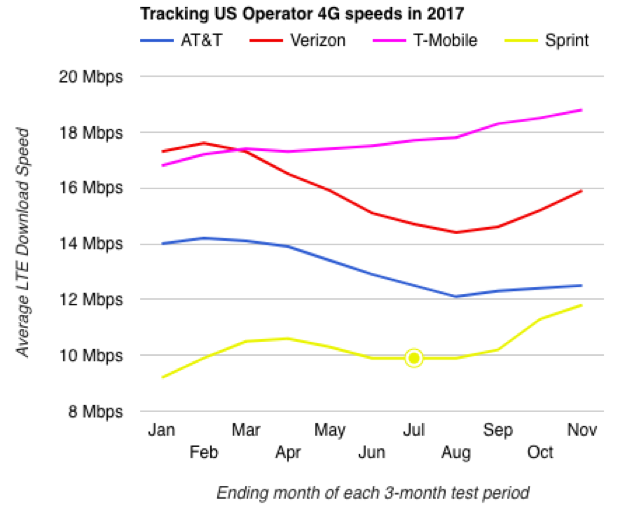U.S. mobile network speeds dropped during 2017 when operators went all in with unlimited data plans, according to an analysis done by OpenSignal, a London-based mobile metrics consultancy. Carriers responded well, although speeds weren’t back up to pre-unlimited levels. But you can forget about mobile as a replacement for wireline service.
In the first half of 2017, AT&T and Verizon responded to competition from T-Mobile and Sprint and went back to offering unlimited data plans. Over the next few months, the average download speeds on their networks dropped. According to OpenSignal’s latest report, they’ve managed to reverse that trend…
A half year later, there’s both good news and bad news for AT&T and Verizon. The good news is Ma Bell and Big Red seem to have stanched the bleeding created by unlimited plans. After six straight months of tracking decreases in LTE speeds, in September speeds for both operators leveled out in our measurements, and in Verizon’s case, speeds started creeping back upward. The bad news is in November, both AT&T and Verizon were still well short of their 4G speed highs established in February. Meanwhile, Sprint and T-Mobile speeds have steadily increased over the same 11-month period.
OpenSignal also released some market-specific data, including four markets in California: San Francisco-Oakland (which doesn’t apparently take in Silicon Valley), Los Angeles (including Orange County), San Diego and the Inland Empire. In every one of those markets, Verizon had the greatest 4G availability and the fastest download speeds. AT&T had the best network latency performance in L.A. and the northern Bay Area and tied with T-Mobile in San Diego. There was a three way latency tie in the Inland Empire, between Verizon, T-Mobile and AT&T.
The numbers show that U.S. operators are responding to growing consumption of mobile bandwidth, but struggling – successfully, it appears – to keep up with demand. It also gives credence to Ericsson’s prediction that mobile traffic will grow seven-fold in North America over the next five years.
Mobile carriers need to continuing expanding the capacity of their networks and they will. 5G upgrades begin in earnest next year (2018 is the year of 5G pilots) and will continue over the next decade. But they are running as fast as they can just to keep up with mobile data demand. Any suggestion that mobile networks will meaningfully supplant wireline broadband service is nonsense.

